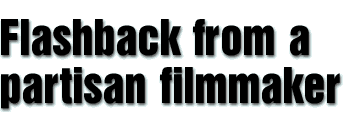|
 |
||
| "It is dangerous to step out of line - and lethal not to." A double-take by Lis Rhodes |
Most writing is written from left to right, or from right to left. All writing is written in the present, from a particular past.
Individual reminiscence, sequences of events and comments selectively recounted, is one vital part of the process of looking back. This implies there is something to look at, to see. A metaphorical stage or film set, where the rehearsal and reconstruction of events can take place in the forecourt of the present- participants, surrounding contexts, voices, familiar faces - all re-emerge and the action is replayed, and redirected. The new story outstrips the original action.
As I write this I have just been told that the average temperature of the world is the hottest it has ever been, since records were kept. I am grateful that the overheating of the world is on record. My regret is that records tend to record symptoms not the causes. The study of the first may lead to the diagnosis of the other. But remedies are unlikely while living and working here depend on an overheated economy. And any record or measurement made must be from a position of partial collusion.
In the recounting, retelling of anything, whether by a person or an 'authority', there is always a rehearsal, a selection of facts, memories. Things are bound to happen. Tragedy, comedy and nostalgia, the dramatics of memory colour recall and re-telling. Inevitably someone will summarise and edit, and film directors and writers are particularly adept at reducing years into minutes, actions into seconds and fiction into fact. Since my films are as verbal as they are visual, the texts themselves can be seen as an account from which I have selected a 'scratch' record of excerpts, of stills, that could be spoken to the tune of times change, and so they do and so they don't. Mostly they don't, because there is no intention that they should. The scale alters, records increase, resources diminish, there is no relief in acceleration for most people suffocating in the fumes of an overheated world.
As an artist, as a filmmaker the investigation (the Flashback) becomes a composition, a geographical tracing of the political nature of emotion, the economies of thinking, and invisible subjects in a competitive environment which relies on repetition to mask its insecurity, let alone its overheating.
THE POLITICAL CONSTRUCTION OF EMOTION
"The answer and the question occupy the same space. They are already familiar, if not known to each other. Emotionally they live within the same political order."
"it wasn't easy to find each other / the distance had grown / year by year / she watched the emerald sun / roll round the world a bullet on a saucepan lid"
(Cold Draft, 1988)
"it wasn't as if it wasn't seen / it was / it was seen and they went shopping / they spoke about it, worried / and went to bed / they will ask themselves / how was it we never knew?"
(Just About Now, 1993)
"there had been other things /that I had meant to say / but memories are foreshortened / in a cold snap / angels blossom in graveyard kitchens / forgetting to sharpen their knives / hold contradiction under the tongue"
(Deadline, 1991)
Sounds are affective. Images are instructive. In reversing, turning over, the notation, or perhaps the connotation of images and words, it becomes alarmingly apparent that words - (and not only in their relationship within sentences) - are to be believed, or not, and are therefore emotional. This is why lots can be said and nothing happens, or nothing is said and a lot happens. One person's word against another's. The answer and the question occupy the same space. They are already familiar if not known to each other. Emotionally they live within the same political order, that is of manipulation and persuasion.
Images do not 'say'. They are instructive. They are said 'to speak for themselves'. And I think they do...
Full article published in Filmwaves - Issue 6, Winter 1999. Subscribe now!
